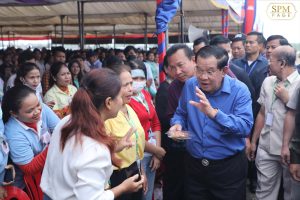It can never be said of Cambodian Prime Minister Hun Sen that he doesn’t let the public in on his dictatorial thinking. Maybe it’s the way his mind works: his inclination to talk without notes; to riff through speeches. Maybe it’s because he seems to still enjoy giving almost daily, hours-long addresses when inaugurating new roads or overpasses or schools or attending just about any public event. Either way, wait long enough and he’ll contradict an earlier comment with the actual truth.
Speaking on May 22, he had this to say about Kem Sokha, the opposition leader who was detained in 2017 on treason charges and convicted of it (and sentenced to house detention for 27 years) this March. “I was about to ask the King and the court to pardon and release Sokha,” he said, “but I could not do so because of some untrustworthy foreign diplomats who always shake my hands but meet and invite Sokha to visit their embassies secretly…I do not trust diplomats who insult me or the sovereignty of the country.”
If the Khmer Times quoted him correctly (and there’s precedent for a newspaper being banned if it didn’t) then the prime minister has just admitted to the peculiar. Presumably, he thinks that Kem Sokha should be pardoned. Why else was he “about to ask” the King to do so? And that means Hun Sen also presumably thinks that Kem Sokha’s 27-year sentence under house arrest is unnecessary and that he should be given back his liberty. Most importantly, he also presumably thinks that Kem Sokha no longer harbors the “treasonous” ambitions for which he was sentenced. So, Hun Sen has established that Kem Sokha should be walking freely around Phnom Penh today.
But he isn’t requesting a pardon, the prime minister stated, because of the actions of foreign diplomats. Does he mean that he thinks those “untrustworthy foreign diplomats” will try to indoctrinate Kem Sokha into “treasonous” actions again? Unlikely. Kem Sokha has been meeting with those diplomats for several years and Hun Sen has admitted that he was “about to” ask for a pardon. Instead, what seems to have been disclosed is that Kem Sokha is still in detention because Hun Sen wants to first, keep him as leverage over those foreign diplomats and, second, to stick a finger in the eye of those diplomats. Take a comment from another speech made last week. “Those individuals [presumably Kem Sokha] will serve their full sentences because you love them too much,” Hun Sen said, referring to foreign diplomats. “I won’t pardon them because I don’t trust you. I say this frankly.”
One could spin it that Hun Sen is protecting his country’s national sovereignty, as he claims. But there’s a perversion of sovereignty when you change your own mind on something because of the actions of a foreign diplomat, as Hun Sen admitted to doing. Or, indeed, that you imprison one of your own nationals in order to spite a foreigner. In reality, Hun Sen has always wanted to use Kem Sokha’s liberty as a bargaining chip. If, he says, Western democracies want to see Kem Sokha pardoned and released (which they have called for since 2017), foreign diplomats need to stop criticizing the government’s actions. That’s so bare-nakedly in preparation for the criticism Hun Sen expects to receive because of the conduct of July’s general election that the Cambodian leader is likely to admit it one day soon.
July’s general election won’t be free or fair. No Western country will send election monitors. Now with the main opposition party, the Candlelight Party, barred from competing, the ruling Cambodian People Party (CPP) will almost certainly win all 125 parliamentary seats, as it did at the last general election. Criticism could be fierce. The European Union could impose further trade sanctions on Cambodia. The United States could impose more targeted sanctions on officials. Renewal of Cambodia’s place in Washington’s Generalized Special Preference (GSP) trade scheme won’t happen. Japan and Australia may join in on punitive measures. Cambodia’s international image will take another battering.
Aged 70 and nearing the end of his frontline political career, Hun Sen is still as Machiavellian as ever, though. By making public his reasoning for Kem Sokha’s freedom, it shifts the blame and compels Western critics to rethink their positions. Are foreign governments responsible for the liberty of Kem Sokha? Should they criticize the conduct of July’s general election as forcefully as they might want to because they think leniency would earn Kem Sokha a pardon? Hun Sen has now prepared his narrative after the election: it’s those pesky foreign diplomats, now condemning Cambodia’s elections, who are also to blame for Kem Sokha not getting a pardon.
There’s already a line of thinking in Western capitals that criticism should be kept to a minimum so as not to destabilize Hun Sen’s dynastic succession to his eldest son, Hun Manet, a process that will properly start after July’s general election. Some think that a Hun Manet administration will be more congenial to the West and, perhaps, more open to reform. Even the less sanguine reckon that punitive Western actions could destabilize the succession process. Such dynastic handovers of power rarely go to plan, and there’s no guarantee Cambodia will descend into conflict if something goes wrong.
Western trade sanctions and a heightening of tensions especially over Cambodia’s “ironclad” friendship with China would cause some instability. If push comes to shove, foreign investors and Western governments would prefer a few more years of Hun Sen’s authoritarian tactics than a destabilized Cambodia; an unstable Cambodia, one could argue, would have far worse consequences for the region than the ongoing Myanmar crisis. By throwing Kem Sokha’s liberty into the mix, it adds another layer of incentive for Western governments to don the kids’ gloves after July’s ballot.

































